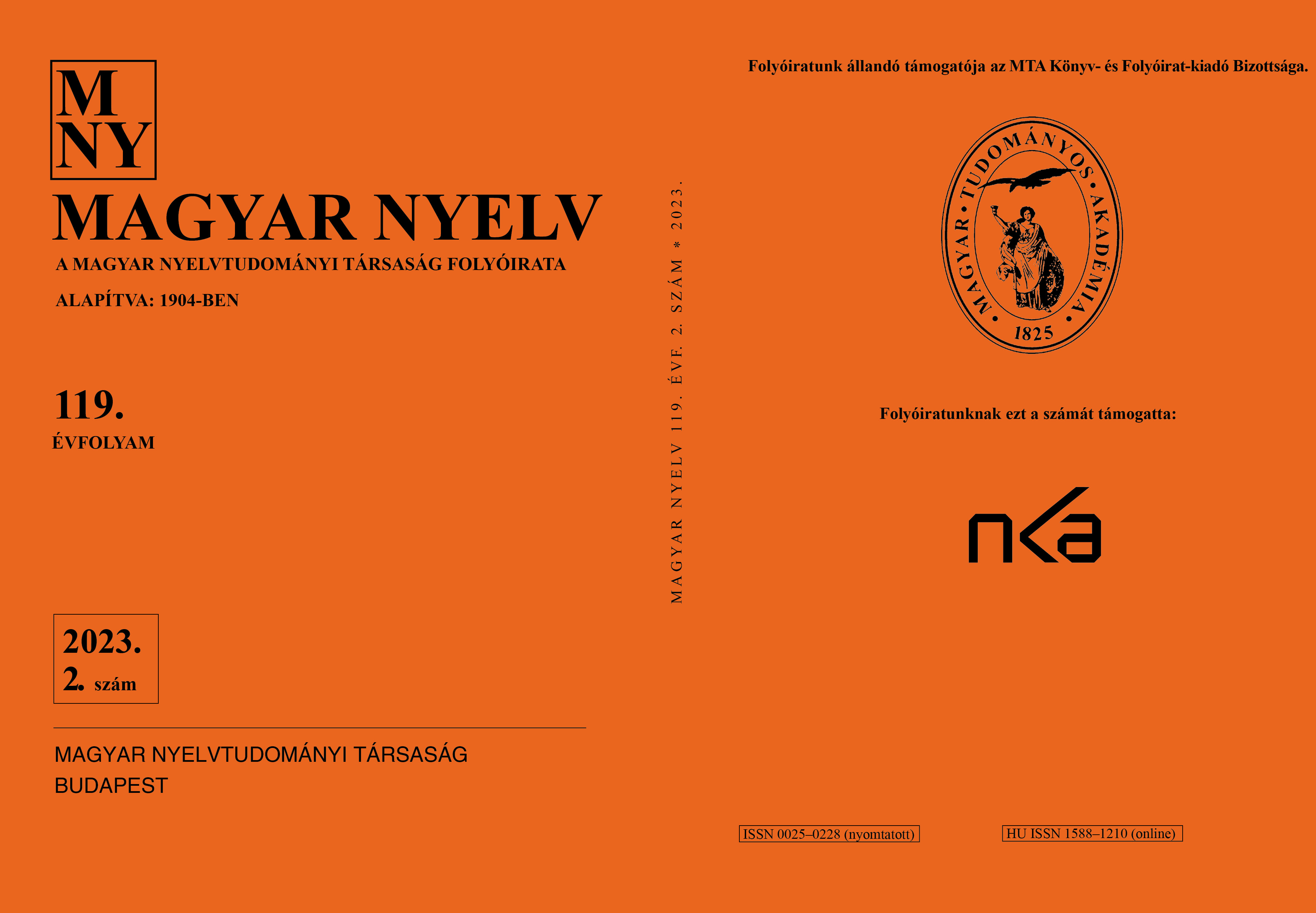Régi és új etimológiák
DOI:
https://doi.org/10.18349/MagyarNyelv.2023.2.205Kulcsszavak:
etimológia, jelentéstan, történeti dialektológia, kódexek, ős- és ómagyar nyelvAbsztrakt
A tanulmányban három korábbi etimológiai ötletemhez fűztem további magyarázatokat, illetve két újabb szó történetéhez nyújtottam adatokat. A bagoly madárnév etimológiájához a névadás alapjául szolgáló hangadás képzetének idegen nyelvi mintája lehet párhuzam. Az orr szóból képzett orom, oromzat és orozat régi helynévi adatai alapján ezek nem minden változatban tekinthetők szinonimának. Az ősmagyar gyula méltóságnév mögött egy univerzálisnak tekinthető jelenség állhat: a (katonai vagy vallási) hatalmat a viselője és környezete hő és fény formájában tapasztalja meg. A búsz és a buz habár két hasonló alakú és jelentésű szó, ezért a beszélők tudatában keveredhettek, néhány régi kódexrészlet jelentése alapján mégis két külön szónak tartom ezeket.
##submission.downloads##
Megjelent
Folyóiratszám
Rovat
License
Copyright (c) 2023 Dániel Németh

This work is licensed under a Creative Commons Attribution-NonCommercial-NoDerivatives 4.0 International License.
A periodika Open Access hozzáférésű (Gyémánt). A dokumentumok elektronikus formában szabadon elmenthetők, másolhatók; változtatások nélkül, a forrásra való hivatkozással használhatók. Az alkalmazás kereskedelmi célokat nem szolgálhat. Bármilyen terjesztési és felhasználási forma esetében az 1999. évi LXXVI. szerzői jogról szóló törvény és az ahhoz kapcsolódó jogszabályok az irányadók. Elektronikus változatára a CC BY-NC-ND (Creative Commons – Attribution-NonCommercial-NoDerivatives) licenc feltételei érvényesek.
A folyóirat a szerzők számára időbeli korlátozás nélkül és díjmentesen engedélyezi, hogy kézirataiknak a szerkesztőség által elfogadott, akár a lektori javításokat is tartalmazó, de nem végleges (ún. pre-print) változatait közzétegyék: e-mailen, a szerző vagy intézménye honlapján, illetve a szerző intézményének, egyetemének zárt vagy korlátozás nélkül elérhető repozitóriumában, illetőleg egyéb non-profit szervereken. Amikor a szerző ily módon terjeszti művét, figyelmeztetnie kell olvasóit, hogy a szóban forgó kézirat nem a mű végső, kiadott változata. Ha a cikk végső változata már megjelent nyomtatott, illetve online formában, mindenképpen javasolt és engedélyezett a szerzőnek ezen (post-print) változatot használnia. Ebben az esetben meg kell adnia a folyóiratbeli megjelenés pontos helyét, adatait is. A szerző a közlemény szerzői jogait megtartja, esetleges másodközlés esetén azonban a cikk első megjelenésének bibliográfiai adatait is közölnie kell.




